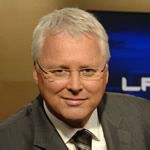
Tony Jones, the much-loved anchor of ABC TV’s
Lateline,
is at the helm of MUP’s new book,
Best Political Writing 2008
, the first in a planned series. Jo Case spoke to him about the process of selecting the year’s best political writing, and the transition from screen to print.
What was it that appealed to you about working on this book?
If I was a footy player, I’d describe it as off-season training. Instead of sitting at the beach through the summer break with a pile of salt-damaged novels, I carted a green Woolies bag around with me with a selection of photocopied essays and articles. If that doesn’t sound like much fun, you have to think of 2007 as the year when too much politics was never enough.
What emerged for you as the major political issues of the past year when you were putting this book together?
Leadership was the number one issue, with the accompanying theme of youth versus age. The rise of Kevin Rudd and the fast erosion of John Howard are thoroughly examined. Underpinning Howard’s demise were issues like Work Choices and climate change, the fates of Hicks and Haneef, the Iraq war, housing affordability, interest rates and education. Then there was the Northern Territory intervention in response to revelations of widespread sexual abuse of children in remote aboriginal communities. Responding to that emergency is one of the most profound moral issues of our time and, as our authors remorselessly remind us, it is born of violence, drug and alcohol abuse, failing schools, welfare dependency, decrepit housing and Third World health standards.
How did you select the pieces – was it based on the most prominent issues, the best writing, or a combination of both?
In truth it was a combination of both. The ‘best political writing’ and ‘best writing’ were bound to be different animals. The best analysis is often somewhat prosaic. Paul Kelly’s writing style, for example, may lack poetry and wit, but the journalism more than compensates for that. Bear in mind that much political writing is pumped out under pressure of urgent deadlines. In this collection, therefore, you get a combination of significant pieces from newspapers and more considered and usually better constructed essays from magazines and journals. To my mind Noel Pearson’s ‘White guilt, victimhood … etc’ is the purest example of great writing used to convey profound thought on a contemporary political issue.
You work as a broadcaster in your day-to-day life. Did you find working with the printed word a different experience – and if so, how?
You may be surprised to know how much writing I do as a broadcaster. Of course the tone is more conversational to create the illusion that’s it’s made up as I go along - but writing nonetheless. Perhaps that has influenced how I write for print. That’s for others to judge. But this process did remind me how much I still love the craft of writing and, it’s fair to say, the knowledge that the words would be stuck on paper and bound into permanency certainly concentrated the mind, especially when you realise you must sit in there alongside some true writers of great ability.
What were the biggest challenges of putting the book together?
The biggest challenge was to encapsulate the best work that reflected a truly historic year in politics. It was not hard, after a decade of reflection on his leadership, to find powerful and insightful writing on John Howard, but Kevin Rudd was another matter. In many respects he’s an unfinished portrait, a picture still emerging. The writing about him has that same quality. People search his past for clues based on his style and work ethic as a Queensland reformer and technocrat and on his religious philosophy and its implications. But for most of us, the jury is out and we will have to see how this talented and untested man evolves as a national leader.
With the change of government, 2008 is already shaping up to be a very different year in politics. Based on what you’ve observed so far, do you think the next edition of this book will be significantly different in tone and content? If so, how?
By the next edition, we’ll all have a much better idea of how Kevin Rudd is evolving and which of his ministers grow in the public’s imagination. Given the parlous state of the Liberal Party, brought to its lowest ebb by Howard’s hubris, we are bound to have a fascinating leadership story to tell. The tone could be one of great anticipation or thwarted expectations, depending on what the government can achieve in treacherous economic conditions. But if things worsen, if we find ourselves in a global recession, we could even be asking the question: Is government now, for Labor, a poisoned chalice?


